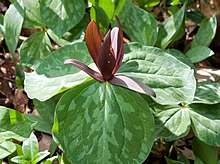Trillium cuneatum
| Trillium cuneatum | |
|---|---|

| |
| Trillium cuneatum Cheekwood Botanical Garden Nashville, Tennessee | |
| Scientific classification | |
| Kingdom: | Plantae |
| Clade: | Tracheophytes |
| Clade: | Angiosperms |
| Clade: | Monocots |
| Order: | Liliales |
| Family: | Melanthiaceae |
| Genus: | Trillium |
| Species: | T. cuneatum
|
| Binomial name | |
| Trillium cuneatum Raf., 1840
| |

| |
| US distribution by state of Trillium cuneatum | |
| Synonyms[2] | |
| |
Trillium cuneatum, the little sweet Betsy,[3] also known as whip-poor-will flower, large toadshade, purple toadshade, and bloody butcher,[4] is a species of flowering plant in the family Melanthiaceae. It is native to the southeastern United States but is especially common in a region that extends from southern Kentucky through central Tennessee to northern Alabama.[5] In its native habitat, this perennial plant flowers from early March to late April (depending on latitude). It is the largest of the eastern sessile trilliums.[6]
Trillium cuneatum prefers to grow in rich soils in mostly upland woods, especially limestone soils but also at less calcareous sites. It is found at elevations of 50–400 m (160–1,310 ft)[4] and has three broad, mottled leaves surrounding a sessile, banana-scented flower. The petals are erect and either maroon, bronze, green, or yellow in color.[7]
A few scattered populations of Trillium cuneatum can be found in Michigan and other more northern states,[6][8] presumably due to anthropogenic effects. More recently, there have been dozens of citizen science observations in the eastern United States from Washington, D.C. to New York City.[9]
References[]
- ^ "Trillium cuneatum". NatureServe Explorer. NatureServe. Retrieved 2008-05-02.
- ^ Kew World Checklist of Selected Plant Families
- ^ "Trillium cuneatum". Natural Resources Conservation Service PLANTS Database. USDA. Retrieved 15 December 2015.
- ^ Jump up to: a b Case Jr., Frederick W. (2002). "Trillium cuneatum". In Flora of North America Editorial Committee (ed.). Flora of North America North of Mexico (FNA). 26. New York and Oxford – via eFloras.org, Missouri Botanical Garden, St. Louis, MO & Harvard University Herbaria, Cambridge, MA.
- ^ Freeman, J. D. (1975). "Revision of Trillium subgenus Phyllantherum (Liliaceae)". Brittonia. 27 (1): 1–62. doi:10.2307/2805646. JSTOR 2805646. S2CID 20824379.
- ^ Jump up to: a b Pistrang, Mark. "Little Sweet Betsy (Trillium cuneatum)". United States Forest Service. Retrieved 15 July 2019.
- ^ Carman, Jack B. (2001). Wildflowers of Tennessee. Highland Rim Press. p. 372.
- ^ "Trillium cuneatum". County-level distribution map from the North American Plant Atlas (NAPA). Biota of North America Program (BONAP). 2014. Retrieved 30 August 2019.
- ^ "Citizen science observations for Trillium cuneatum". iNaturalist. Retrieved 1 September 2019.
External links[]
- NatureServe apparently secure species
- Trillium
- Flora of the Southeastern United States
- Flora of the Appalachian Mountains
- Flora of Illinois
- Flora of Pennsylvania
- Endemic flora of the United States
- Plants described in 1840
- Taxa named by Constantine Samuel Rafinesque
